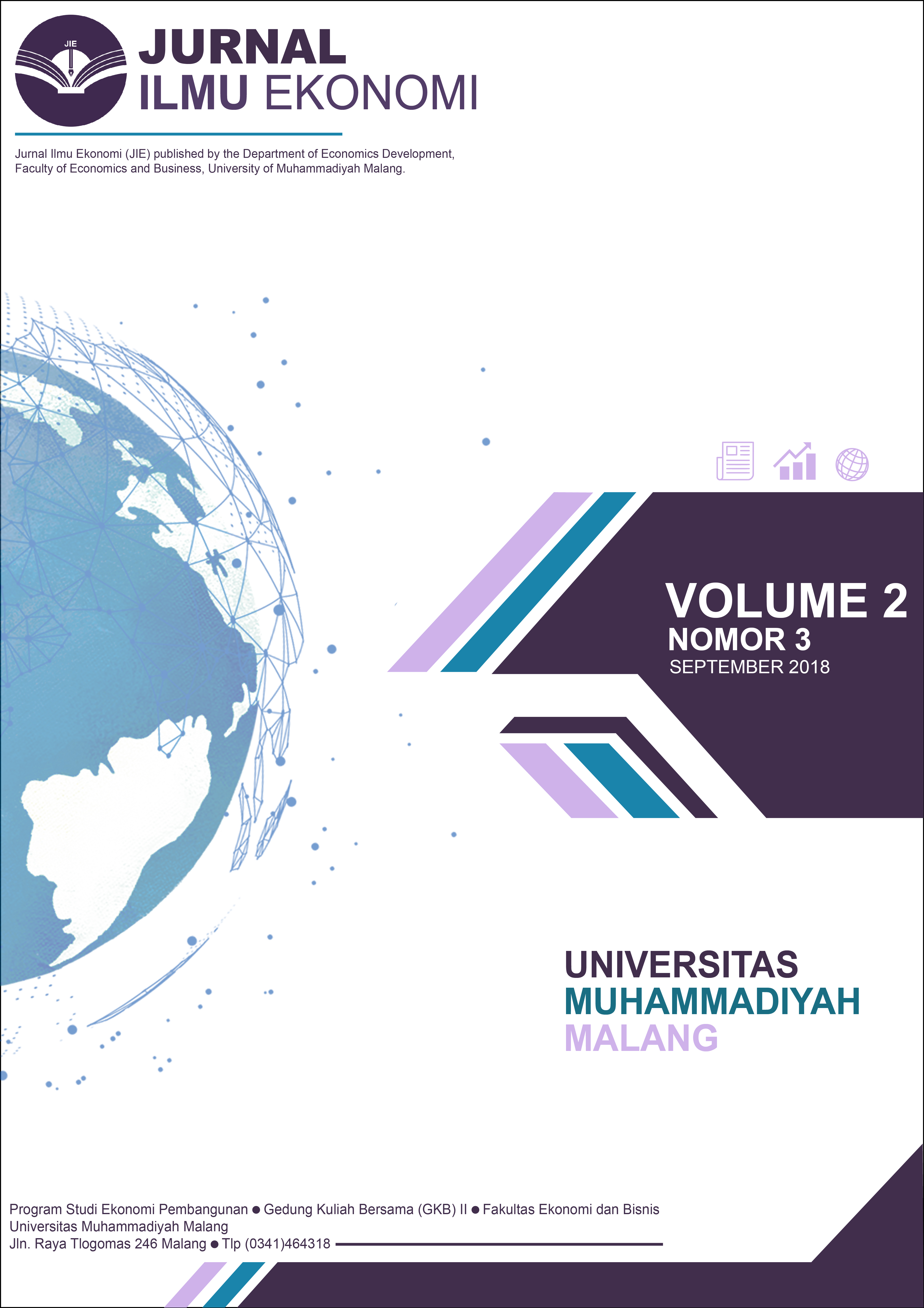ANALISIS PENGARUH JUMLAH INDUSTRI DAN INDEKS PEMBANGUNAN MANUSIA TERHADAP JUMLAH PENDUDUK MISKIN DI KABUPATEN/KOTA PROVINSI BANTEN TAHUN 2012-2016
DOI:
https://doi.org/10.22219/jie.v2i3.7110Abstract
Title: "Analysis of the Influence of the Number of Industry and Human Development Index on the Number of Poor People in the Regency / City of Banten Province 2012-2016". The purpose of this research is to analyze poverty as well as to analyze the influence of industry variable and human development index on the number of poor people in Banten regency / city. The analysis tool used is panel data regression analysis. Based on the analysis of the number of poor people in Banten province still shows a high poverty rate. From the results of the study it can be explained that the variable number of industries has a negative and significant effect on poverty with an F-statistic value of 13.24154 and T-statistics of 3.354906, and the human development index variables have a positive and significant effect on the number of poor people with F- statistics of 13.24154 and T-statistics of 5.040772.
Keywords: index of human ,industry, poor.
Downloads
References
DAFTAR PUSTAKA
Arfida. (2005). POTENSI SUMBER DAYA DAERAH DAN KESEJAHTERAAN KELUARGA TKI.
Arifin, Z. (2009). Kesenjangan Dan Konverg Ensi Ekonomi Antar Kabupaten Pada Empat Koridor Di Propinsi Jawa Timur. Humanity, IV, 154–164. Retrieved from http://ejournal.umm.ac.id/index.php/humanity/article/viewFile/821/3007
Aris Soelistyo. (2004). ANALISIS FLYPAPER EFFECT PAD DAN DAU TERHADAP BELANJA DAERAH DI PROVINSI KALIMANTAN TIMUR TAHUN 2010-2014 Aisyah, 3.
Badan Pusat Statistik. (2018). Banten Dalam Angka. Retrieved from https://banten.bps.go.id/
Bappenas. (2018). IPM. Retrieved from https://www.bappenas.go.id/id/
Kaluge, D. (2017). ANALISIS PENGARUH PENGELUARAN PEMERINTAH SEKTOR PENDIDIKAN DAN KESEHATAN TERHADAP KEMISKINAN DI JAWA TIMUR. Jurnal Ekonomi Pembangunan, 15(2), 130.
Ningrum, S. S. (2017). ANALISIS PENGARUH TINGKAT PENGANGGURAN TERBUKA, INDEKS PEMBANGUNAN MANUSIA, DAN UPAH MINIMUM TERHADAP JUMLAH PENDUDUK MISKIN DI INDONESIA TAHUN 2011-2015. Jurnal Ekonomi Pembangunan, 15(2).
Nurcholis, M. (2014). Analisis Pengaruh Pertumbuhan Ekonomi, Upah Minimum dan Indeks Pembangunan Manusia Terhadap Tingkat Pengangguran Di Provinsi Jawa Timur Tahun 2008-2014. Jurnal Ekonomi Pembangunan, 12.
Rejekiningsih, T. W. (2002). Mengukur Besarnya Peranan Industri Kecil Dalam Perekonomian Di Propinsi Jawa Tengah, 125–136.
Siregar, H., & Wahyuni, D. (2007). Dampak Pertumbuhan Ekonomi Terhadap Penurunan Jumlah Penduduk Miskin. Economics Development, (pertumbuhan ekonomi dan penduduk miskin), 1–28. https://doi.org/http://pse.litbang.deptan.go.id/ind/pdffiles/PROS_2008_MAK3
Sri, M., & Suliswanto, W. (2010). PENGARUH PRODUK DOMESTIK BRUTO (PDB) DAN INDEKS PEMBANGUNAN MANUSIA (IPM) TERHADAP ANGKA KEMISKINAN DI INDONESIA, 8, 358.
Whisnu Adhi Saputra. (2011). ANALISIS PENGARUH JUMLAH PENDUDUK, PDRB, IPM, PENGANGGURAN TERHADAP TINGKAT KEMISKINAN DI KABUPATEN/KOTA JAWA TENGAH.
World bank. (2004). poor. Retrieved from https://www.worldbank.org/
Yacoub, Y. (2012). Pengaruh Tingkat Pengangguran terhadap Tingkat Kemiskinan Kabupaten / Kota di Provinsi Kalimantan Barat, 8, 176–185.
Downloads
How to Cite
Issue
Section
License
Authors who publish with this journal agree to the following terms:
- For all articles published in the JIE (Jurnal Ilmu Ekonomi), copyright is retained by the authors. Authors give permission to the publisher to announce the work with conditions. When the manuscript is accepted for publication, the authors agree to the automatic transfer of non-exclusive publishing rights to the publisher.
- Authors retain copyright and grant the journal right of first publication with the work simultaneously licensed under a Creative Commons Attribution-NonCommercial-ShareAlike 4.0 International License that allows others to share the work with an acknowledgement of the work's authorship and initial publication in this journal.
- Authors are able to enter into separate, additional contractual arrangements for the non-exclusive distribution of the journal's published version of the work (e.g., post it to an institutional repository or publish it in a book), with an acknowledgement of its initial publication in this journal.
- Authors are permitted and encouraged to post their work online (e.g., in institutional repositories or on their website) prior to and during the submission process, as it can lead to productive exchanges, as well as earlier and greater citation of published work (See The Effect of Open Access).
This is an open access article and licensed under a Creative Commons Attribution-NonCommercial-ShareAlike 4.0 International License








